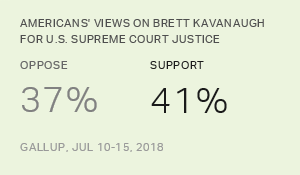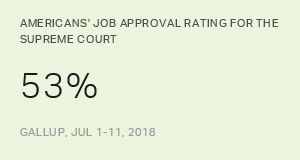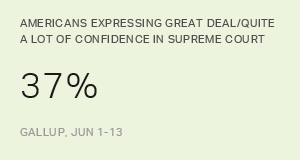Story Highlights
- 40% favor, 36% oppose Kavanaugh's confirmation
- Opinions stable compared with prior measure in July
- Support for Kavanaugh among lowest for recent nominees
WASHINGTON, D.C. -- As Senate hearings begin on the nomination of Brett Kavanaugh to the U.S. Supreme Court, Americans remain closely divided as to whether he should be seated on the court. Forty percent of Americans say the Senate should vote to confirm him, while 36% say it should not do so. These opinions are essentially unchanged from when President Donald Trump announced his choice of Kavanaugh in July, and they continue to be highly polarized by party.
| Vote in favor | Not vote in favor | No opinion | ||||||||||||||||||||||||||||||||||||||||||||||||||||||||||||||||||||||||||||||||||||||||||||||||||
|---|---|---|---|---|---|---|---|---|---|---|---|---|---|---|---|---|---|---|---|---|---|---|---|---|---|---|---|---|---|---|---|---|---|---|---|---|---|---|---|---|---|---|---|---|---|---|---|---|---|---|---|---|---|---|---|---|---|---|---|---|---|---|---|---|---|---|---|---|---|---|---|---|---|---|---|---|---|---|---|---|---|---|---|---|---|---|---|---|---|---|---|---|---|---|---|---|---|---|---|---|
| % | % | % | ||||||||||||||||||||||||||||||||||||||||||||||||||||||||||||||||||||||||||||||||||||||||||||||||||
| All adults | ||||||||||||||||||||||||||||||||||||||||||||||||||||||||||||||||||||||||||||||||||||||||||||||||||||
| 2018 Aug 20-26 | 40 | 36 | 24 | |||||||||||||||||||||||||||||||||||||||||||||||||||||||||||||||||||||||||||||||||||||||||||||||||
| 2018 Jul 10-15 | 41 | 37 | 22 | |||||||||||||||||||||||||||||||||||||||||||||||||||||||||||||||||||||||||||||||||||||||||||||||||
| Republicans | ||||||||||||||||||||||||||||||||||||||||||||||||||||||||||||||||||||||||||||||||||||||||||||||||||||
| 2018 Aug 20-26 | 72 | 8 | 20 | |||||||||||||||||||||||||||||||||||||||||||||||||||||||||||||||||||||||||||||||||||||||||||||||||
| 2018 Jul 10-15 | 76 | 9 | 15 | |||||||||||||||||||||||||||||||||||||||||||||||||||||||||||||||||||||||||||||||||||||||||||||||||
| Independents | ||||||||||||||||||||||||||||||||||||||||||||||||||||||||||||||||||||||||||||||||||||||||||||||||||||
| 2018 Aug 20-26 | 37 | 37 | 25 | |||||||||||||||||||||||||||||||||||||||||||||||||||||||||||||||||||||||||||||||||||||||||||||||||
| 2018 Jul 10-15 | 38 | 37 | 25 | |||||||||||||||||||||||||||||||||||||||||||||||||||||||||||||||||||||||||||||||||||||||||||||||||
| Democrats | ||||||||||||||||||||||||||||||||||||||||||||||||||||||||||||||||||||||||||||||||||||||||||||||||||||
| 2018 Aug 20-26 | 17 | 64 | 20 | |||||||||||||||||||||||||||||||||||||||||||||||||||||||||||||||||||||||||||||||||||||||||||||||||
| 2018 Jul 10-15 | 14 | 67 | 19 | |||||||||||||||||||||||||||||||||||||||||||||||||||||||||||||||||||||||||||||||||||||||||||||||||
| Gallup | ||||||||||||||||||||||||||||||||||||||||||||||||||||||||||||||||||||||||||||||||||||||||||||||||||||
Senate hearings to confirm Trump's nomination of Kavanaugh to replace retiring justice Anthony Kennedy begin Tuesday. Republicans, who are the majority party in the Senate, are hoping to seat Kavanaugh on the Supreme Court before its new term begins in October.
The lack of change in opinions between Kavanaugh's initial rating and his second one may not be surprising because his hearings have not yet begun. But historically, nominees' support has not moved much between their first and second ratings, even when hearings had taken place between those measurements. Typically, there has been a modest increase in opposition and a decline in the percentage who do not have an opinion.
Since 1987, Gallup has obtained multiple measures on seven Supreme Court nominees before Kavanaugh. On average, there has been a six-point increase in the percentage wanting the Senate to vote against confirmation and a concomitant six-point drop in the percentage without an opinion, with no increase in support, between the first and second measurements for these nominees.
| First reading | Second reading | Change, vote in favor | Change, not vote in favor | Change, no opinion | |||||||||||||||||||||||||||||||||||||||||||||||||||||||||||||||||||||||||||||||||||||||||||||||
|---|---|---|---|---|---|---|---|---|---|---|---|---|---|---|---|---|---|---|---|---|---|---|---|---|---|---|---|---|---|---|---|---|---|---|---|---|---|---|---|---|---|---|---|---|---|---|---|---|---|---|---|---|---|---|---|---|---|---|---|---|---|---|---|---|---|---|---|---|---|---|---|---|---|---|---|---|---|---|---|---|---|---|---|---|---|---|---|---|---|---|---|---|---|---|---|---|---|---|---|
| pct. pts. | pct. pts. | pct. pts. | |||||||||||||||||||||||||||||||||||||||||||||||||||||||||||||||||||||||||||||||||||||||||||||||||
| Kavanaugh | July 2018 | Aug 2018 | -1 | -1 | +2 | ||||||||||||||||||||||||||||||||||||||||||||||||||||||||||||||||||||||||||||||||||||||||||||||
| Kagan | May 2010 | Jul 2010 | -2 | +2 | 0 | ||||||||||||||||||||||||||||||||||||||||||||||||||||||||||||||||||||||||||||||||||||||||||||||
| Sotomayor | May 2009 | Jul 2009 | -1 | +5 | -6 | ||||||||||||||||||||||||||||||||||||||||||||||||||||||||||||||||||||||||||||||||||||||||||||||
| Alito | Nov 2005 | Dec 2005 | -1 | +4 | -3 | ||||||||||||||||||||||||||||||||||||||||||||||||||||||||||||||||||||||||||||||||||||||||||||||
| Miers | Oct 2005 | Oct 2005 | -2 | +7 | -5 | ||||||||||||||||||||||||||||||||||||||||||||||||||||||||||||||||||||||||||||||||||||||||||||||
| Roberts | Jul 2005 | Aug 2005 | -8 | +6 | +2 | ||||||||||||||||||||||||||||||||||||||||||||||||||||||||||||||||||||||||||||||||||||||||||||||
| Thomas | Jul 1991 | Aug 1991 | +4 | +6 | -10 | ||||||||||||||||||||||||||||||||||||||||||||||||||||||||||||||||||||||||||||||||||||||||||||||
| Bork | Aug 1987 | Sep 1987 | +7 | +10 | -18 | ||||||||||||||||||||||||||||||||||||||||||||||||||||||||||||||||||||||||||||||||||||||||||||||
| AVERAGE | 0 | +6 | -6 | ||||||||||||||||||||||||||||||||||||||||||||||||||||||||||||||||||||||||||||||||||||||||||||||||
| Gallup | |||||||||||||||||||||||||||||||||||||||||||||||||||||||||||||||||||||||||||||||||||||||||||||||||||
Because nominees typically start out with considerably more support than opposition -- 49% to 26%, on average -- the modest increase in opposition during the nomination process still leaves public opinion solidly in the nominee's corner.
Kavanaugh's four-point margin in favor of confirmation is one of the smallest measured to date, leaving him less of a cushion in public support should any problematic issues arise in the hearings.
Gallup has gauged public opinion at least once on 11 different Supreme Court nominees since 1987, all except Anthony Kennedy, David Souter and Stephen Breyer. Kavanaugh along with Robert Bork and Harriet Miers are the only nominees for which the average margin in favor of confirming was less than 10 points. Neither Bork nor Miers was seated on the high court after public opinion shifted further against their nominations.
| Average, vote in favor | Average, not vote in favor | Margin | Number of measurements | ||||||||||||||||||||||||||||||||||||||||||||||||||||||||||||||||||||||||||||||||||||||||||||||||
|---|---|---|---|---|---|---|---|---|---|---|---|---|---|---|---|---|---|---|---|---|---|---|---|---|---|---|---|---|---|---|---|---|---|---|---|---|---|---|---|---|---|---|---|---|---|---|---|---|---|---|---|---|---|---|---|---|---|---|---|---|---|---|---|---|---|---|---|---|---|---|---|---|---|---|---|---|---|---|---|---|---|---|---|---|---|---|---|---|---|---|---|---|---|---|---|---|---|---|---|
| % | % | pct. pts. | |||||||||||||||||||||||||||||||||||||||||||||||||||||||||||||||||||||||||||||||||||||||||||||||||
| Kavanaugh | 41 | 37 | 4 | 2 | |||||||||||||||||||||||||||||||||||||||||||||||||||||||||||||||||||||||||||||||||||||||||||||||
| Gorsuch | 45 | 32 | 13 | 1 | |||||||||||||||||||||||||||||||||||||||||||||||||||||||||||||||||||||||||||||||||||||||||||||||
| Garland | 52 | 29 | 23 | 1 | |||||||||||||||||||||||||||||||||||||||||||||||||||||||||||||||||||||||||||||||||||||||||||||||
| Kagan | 45 | 34 | 11 | 3 | |||||||||||||||||||||||||||||||||||||||||||||||||||||||||||||||||||||||||||||||||||||||||||||||
| Sotomayor | 54 | 32 | 22 | 3 | |||||||||||||||||||||||||||||||||||||||||||||||||||||||||||||||||||||||||||||||||||||||||||||||
| Alito | 51 | 29 | 22 | 4 | |||||||||||||||||||||||||||||||||||||||||||||||||||||||||||||||||||||||||||||||||||||||||||||||
| Miers | 43 | 40 | 3 | 2 | |||||||||||||||||||||||||||||||||||||||||||||||||||||||||||||||||||||||||||||||||||||||||||||||
| Roberts | 56 | 26 | 30 | 5 | |||||||||||||||||||||||||||||||||||||||||||||||||||||||||||||||||||||||||||||||||||||||||||||||
| Ginsburg | 53 | 14 | 39 | 1 | |||||||||||||||||||||||||||||||||||||||||||||||||||||||||||||||||||||||||||||||||||||||||||||||
| Thomas | 55 | 25 | 30 | 5 | |||||||||||||||||||||||||||||||||||||||||||||||||||||||||||||||||||||||||||||||||||||||||||||||
| Bork | 35 | 30 | 5 | 2 | |||||||||||||||||||||||||||||||||||||||||||||||||||||||||||||||||||||||||||||||||||||||||||||||
| Gallup did not measure support for the nominations of Anthony Kennedy, David Souter or Stephen Breyer. | |||||||||||||||||||||||||||||||||||||||||||||||||||||||||||||||||||||||||||||||||||||||||||||||||||
| Gallup | |||||||||||||||||||||||||||||||||||||||||||||||||||||||||||||||||||||||||||||||||||||||||||||||||||
In Gallup's final measurement of Bork in September 1987, 38% were in favor of his confirmation and 35% opposed before the Senate voted against his nomination. In the final measurement on Miers, 42% were in favor and 43% opposed to her confirmation before her nomination was withdrawn.
Although Kavanaugh has his detractors, particularly in Democratic circles for his conservative ideology, his confirmation does not appear to be in serious jeopardy because Republicans have a Senate majority. Few have disputed his qualifications, as occurred with Miers, given Kavanaugh's experience as a federal judge.
His low ratings may then reflect other factors less related to him personally and more to the circumstances surrounding his nomination. One factor could be Trump's choosing a second conservative justice in two years, this one to replace a moderate justice in Kennedy. But increasing U.S. political polarization and Kavanaugh's being nominated by an unpopular president are possibly other factors.
Political Polarization. Support for Kavanaugh's nomination among Republicans (72%) matches the historical average for those who identify with the president's party. But the 64% of Democrats who are opposed greatly exceeds the typical level from those who identify with the other party, 47%. Just as partisans' ratings of presidents have drifted further apart in recent decades, so have their opinions of Supreme Court nominations.
An Unpopular President. The percentage of Americans wanting the Senate to confirm Supreme Court nominees tends to be higher when the president is popular. There is a positive statistical relationship between presidential job approval rating and support for nominees (+.47 correlation).
President Barack Obama's three nominees illustrate the pattern well. Average support for Sonia Sotomayor in 2009 (54%) and Merrick Garland in 2016 (52%) was much higher than it was for Elena Kagan in 2010 (45%). Obama's approval rating was 61% during the Sotomayor nomination process and 51% when he nominated Garland (whose nomination was not considered by the GOP-led Senate). Obama averaged 47% approval when he picked Kagan for the court.
George W. Bush's job approval rating was slightly better in the summer of 2005 (44%) when he nominated John Roberts than in the subsequent fall and winter (41%) when he chose Miers and Alito.
Trump also had a 44% job approval rating when he chose Gorsuch, compared with 41% currently as Kavanaugh makes his way through the nomination process. Support for Gorsuch and Kavanaugh almost precisely matched Trump's job approval rating at the time.
And Clarence Thomas, whose confirmation process was nearly derailed by allegations of sexual harassment, averaged 55% support from the public. That was likely aided by the popularity of President George H.W. Bush, whose approval rating was 69% at the time.
Implications
Kavanaugh begins his nomination process with a lower level of public support than nearly all other recent Supreme Court nominees have enjoyed. As such, the stakes for his hearings are arguably higher than for most prior nominees, as he tries to avoid any missteps or unfavorable revelations that could shift public opinion, and in turn, wavering senators, against him. But as judicial selection has become an increasingly politicized process, the key to his winning confirmation may simply lie in not turning off any of the GOP senators, which would assure his confirmation, given the party's numerical advantage in the Senate.
View complete question responses and trends.
Learn more about how the Gallup U.S. Poll works.




